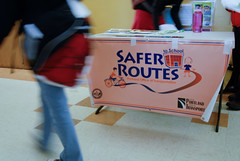Robert Ping, the State Network Coordinator for the Safe Routes to School National Partnership shared a startling bit of information during his presentation at the Safe Routes to School Conference today.
In communities throughout America, students are being told they are not allowed to bike to school.
“It’s pervasive throughout the country and we’re hearing about it more and more,” he said. The problem, according to Ping, is that many school principals and administrators feel that biking and walking to school is simply unsafe. They are concerned about being held liable for anything that happens during the trip to and/or from school.
“It’s pervasive throughout the country and we’re hearing about it more and more.”
— Robert Ping, Safe Routes to School National Partnership
“The problem isn’t necessarily the biking or walking, but the concerns over liability that come with it.” Ping said his organization sees this as “an emerging issue” and they’re in the process of coordinating more research on it. At this point, they want to get a handle on just how many cities have bike bans in place.
In addition to studying the current scope of the problem, the Safe Routes National Partnership is putting together a team of legal experts who will craft a legal statement directed at school principals, outlining why improving biking and walking options will not increase their liability exposure. They hope the legal statement will also help allay the fears that lead to bike ban policies in the first place.
Ping said one safe routes advocate he heard from countered a bike ban in their community by asking the principal whether or not he felt liable for kids who drive to school. “That’s a great way to push back on this idea.”
Ping acknowledges that school principals can’t actually enforce the bans (schools are not responsible for students until they are on school grounds), but even so, they can use their “bully pulpit” to influence the community.
Even in Portland there are liability fears around Safe Routes to School programs In 2007, the City of Portland changed the name of their program from Safe Routes to School to Safer (with an “r”) Routes to School. The reason? PBOT didn’t want to be held liable for suggesting that the routes they recommend are safe. Instead, they wanted the message to be that they are merely “safer” than other routes.
New Jersey is a state where bike ban policies have become a big battle. Leigh Ann Von Hagen, Project Manager for the N.J. Bicycle and Pedestrian Resource Center has been in the middle of that battle. Back in July, she wrote about the issue on the Livable Streets message board. She has worked with School Boards to overturn one bike ban policy so far and hopes for many more victories. “It is true that teenage driving is significantly more dangerous than students bicycling when you look at crash statistics,” she wrote, “Yet, no schools considers banning teenage drivers.”



